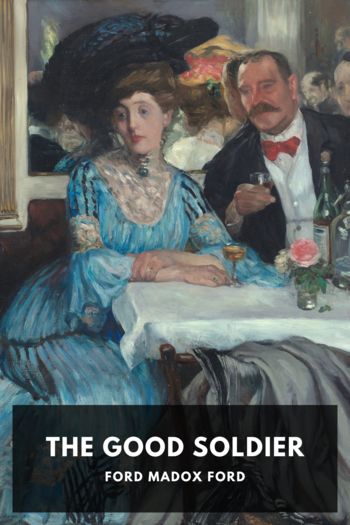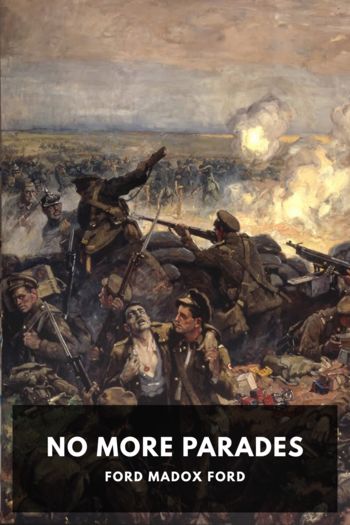The Good Soldier by Ford Madox Ford (top 10 ebook reader TXT) 📕

- Author: Ford Madox Ford
Book online «The Good Soldier by Ford Madox Ford (top 10 ebook reader TXT) 📕». Author Ford Madox Ford
Seeing Florence, as I had seen her, running with a white face and with one hand held over her heart, and seeing her, as I immediately afterwards saw her, lying upon her bed with the so familiar little brown flask clenched in her fingers, it was natural enough for my mind to frame the idea. As happened now and again, I thought, she had gone out without her remedy and, having felt an attack coming on whilst she was in the gardens, she had run in to get the nitrate in order, as quickly as possible, to obtain relief. And it was equally inevitable my mind should frame the thought that her heart, unable to stand the strain of the running, should have broken in her side. How could I have known that, during all the years of our married life, that little brown flask had contained, not nitrate of amyl, but prussic acid? It was inconceivable.
Why, not even Edward Ashburnham, who was, after all more intimate with her than I was, had an inkling of the truth. He just thought that she had dropped dead of heart disease. Indeed, I fancy that the only people who ever knew that Florence had committed suicide were Leonora, the Grand Duke, the head of the police and the hotelkeeper. I mention these last three because my recollection of that night is only the sort of pinkish effulgence from the electric-lamps in the hotel lounge. There seemed to bob into my consciousness, like floating globes, the faces of those three. Now it would be the bearded, monarchical, benevolent head of the Grand Duke; then the sharp-featured, brown, cavalry-moustached feature of the chief of police; then the globular, polished and high-collared vacuousness that represented Monsieur Schontz, the proprietor of the hotel. At times one head would be there alone, at another the spiked helmet of the official would be close to the healthy baldness of the prince; then M. Schontz’s oiled locks would push in between the two. The sovereign’s soft, exquisitely trained voice would say, “Ja, ja, ja!” each word dropping out like so many soft pellets of suet; the subdued rasp of the official would come: “Zum Befehl Durchlaucht,” like five revolver-shots; the voice of M. Schontz would go on and on under its breath like that of an unclean priest reciting from his breviary in the corner of a railway-carriage. That was how it presented itself to me.
They seemed to take no notice of me; I don’t suppose that I was even addressed by one of them. But, as long as one or the other, or all three of them were there, they stood between me as if, I being the titular possessor of the corpse, had a right to be present at their conferences. Then they all went away and I was left alone for a long time.
And I thought nothing; absolutely nothing. I had no ideas; I had no strength. I felt no sorrow, no desire for action, no inclination to go upstairs and fall upon the body of my wife. I just saw the pink effulgence, the cane tables, the palms, the globular match-holders, the indented ashtrays. And then Leonora came to me and it appears that I addressed to her that singular remark:
“Now I can marry the girl.”
But I have given you absolutely the whole of my recollection of that evening, as it is the whole of my recollection of the succeeding three or four days. I was in a state just simply cataleptic. They put me to bed and I stayed there; they brought me my clothes and I dressed; they led me to an open grave and I stood beside it. If they had taken me to the edge of a river, or if they had flung me beneath a railway train, I should have been drowned or mangled in the same spirit. I was the walking dead.
Well, those are my impressions.
What had actually happened had been this. I pieced it together afterwards. You will remember I said that Edward Ashburnham and the girl had gone off, that night, to a concert at the Casino and that Leonora had asked Florence, almost immediately after their departure, to follow them and to perform the office of chaperone. Florence, you may also remember, was all in black, being the mourning that she wore for a deceased cousin, Jean Hurlbird. It was a very black night and the girl was dressed in cream-coloured muslin, that must have glimmered under the tall trees of the dark park like a phosphorescent fish in a cupboard. You couldn’t have had a better beacon.
And it appears that Edward Ashburnham led the girl not up the straight allée that leads to the Casino, but in under the dark trees of the park. Edward Ashburnham told me all this in his final outburst. I have told you that, upon that occasion, he became deucedly vocal. I didn’t pump him. I hadn’t any motive. At that time I didn’t in the least connect him with my wife. But the fellow talked like a cheap novelist.—Or like a very good novelist for the matter of that, if it’s the business of a novelist to make you see things clearly. And I tell you I see that thing as clearly as if it were a dream that never left me. It appears that, not very far from the Casino, he and the girl sat down in the darkness upon a public bench. The lights from that place of entertainment must have reached them through the tree-trunks, since, Edward said, he could quite plainly see the girl’s face—that beloved face with the high forehead, the queer mouth, the tortured eyebrows, and the direct eyes. And to Florence, creeping up behind them, they must have presented the appearance of silhouettes. For





Comments (0)